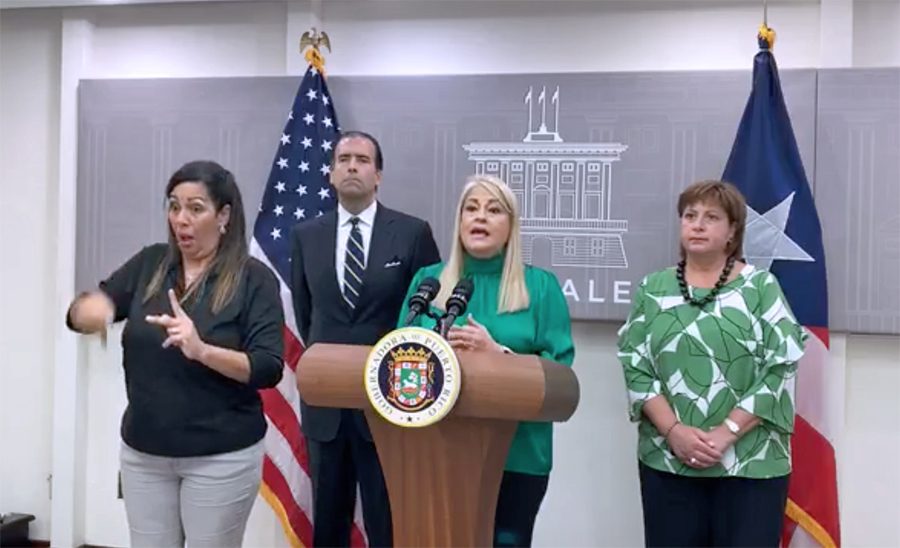Gov. Vázquez unveils $1B relief package to mitigate effect of shutdown

In a prepared message and flanked by Financial Oversight and Management Board for Puerto Rico officials, Gov. Wanda Vázquez unveiled a sweeping incentives package to help individuals and small businesses handle the effects of the COVID-19 shutdown, now entering its second week.
While 134,200 central government employees will continue to receive their paychecks, private-sector workers, particularly the self-employed group, will get relief in the form of cash and a stay on tax payments, she said.
Self-employed workers, estimated at 170,000 — including 19,000 farm workers and 44,000 construction industry laborers — will receive a $500 cash incentive that the government will begin disbursing this week, she said.
The Treasury Department has been instructed to: extend the tax filing deadline to July 15; suspend the collection of the sales and use tax at the docks and in the resale chain for the next three months; suspend the 10% withholding at the origin of payments for professional services for a three-month period; hold off on imposing penalties for non-compliance with the sales and use tax payments due every two weeks, for a period of two months; and to not impose penalties for non-compliance with the payment of the first payments of the estimated tax.
All told, that represents an economic impact of about $100 million, which Vázquez said got the OK from the Oversight Board.
“Our government is committed to all of the island’s workers and employers, therefore, we will do everything we have to do to prevent this emergency from having further effects on the shoulders of the productive sector,” she said during the televised message in which she had beside her Oversight Board President José Carrión and Executive Director Natalie Jaresko.
Meanwhile, through the Department of Economic Development and Commerce, the government will earmark $1,500 for small- and mid-sized businesses with 50 employees or less that have had to shut down in response to the governor’s mandate. That aid adds up to $60 million, she said.
Public and private-sector nurses will receive a stipend of up to $4,000 each and health technicians up to $2,500 for a total of $187 million. Emergency response personnel will receive $4,000 each and up to $3,500 to police, firefighters and correctional officers. That adds up to another $50 million.
Through the Education Department, the government will assign $240 million to buy technology, software and pay for training courses for some 325,000 public school teachers, students and directors to encourage distance learning.
Public hospitals will get $30 million split in two equal disbursements to buy equipment to respond to the COVID-19 emergency, she said. Another $20 million will go toward buying equipment through the Department of Public Safety — such as gloves, face masks and hand sanitizers, among others.
Another $50 million will be disbursed over a two-month period to municipalities that may have experienced losses as a result of the emergency. Vázquez said the government will establish requirements to evidence the negative effects.
On the other hand, she said the Oversight Board approved increasing unemployment benefits starting in July. The Labor Department has been instructed to coordinate with federal authorities to extend unemployment benefits to the self-employed group, which is not regularly available to the sector.
The same will apply to workers who were asked to take unpaid leave, she said.
Vázquez ordered that utility companies — Puerto Rico Electric Power Authority and Puerto Rico Aqueduct and Sewer Authority — refrain from shutting off water and electricity services through the emergency. Tolls will also be suspended.
Finally, as long as the Executive Order is in effect — which as of now is until Mar. 30 — government employees will be encouraged to work remotely from home, as well as independent contractors, professional service providers, companies, private suppliers and nonprofits.
Finally, banks and credit unions will offer 90-day moratoriums on mortgage, auto, personal and commercial loans, as well as credit cards, she said. The moratoriums will not kick-in automatically, so people must contact their financial institution to make arrangements, she said.
“This would be one of the most comprehensive and ambitious packages that have been awarded to deal with this crisis. Much more comprehensive measures than those offered nationwide,” Vázquez said.
“For example, California announced a $500 million package and Washington State a $200 million package. We announced a first package of almost a billion dollars for our Puerto Rican people, achieved in conjunction with the Oversight Board,” she said, stating that additional measures are under evaluation and will be informed at a later date, specifically related to the tourism industry.












